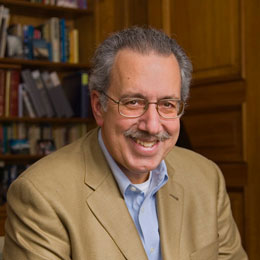
In September 2013, Distinguished University Professor Richard Boyatzis and Anthony Jack, assistant professor of cognitive science, philosophy and psychology, discussed using crowdsourcing as a method of raising funds to further their research on effective leadership. Nearly a year later, they are in the midst of a Kickstarter campaign that could raise enough for their research. The effort is also an experiment in new potential avenues to support important university-based research.
The researchers hope to tap into a new pool of donors. Instead of large donations from a limited number of people, they hope to receive modest contributions from more donors.
Boyatzis and Jack’s Kickstarter campaign can be found here.
“A person doesn’t have to be a billionaire to make a donation that matters,” said Boyatzis, the H.R. Horvitz Professor of Family Business
The study, which continues their research on how two leadership styles—staying on task and being empathetic—compete.

“For us, it makes sense that it’s all about juggling these two networks that fight with each other,” explained Jack, an associate professor of cognitive science, psychology and philosophy. “We believe that really effective leaders need to do more than just get things done. They need to bring people with them.”
The study is linked with Boyatzis’ massive open online course (MOOC), “Inspiring Leadership Through Emotional Intelligence.” In his MOOC, Boyatzis presents ideas from previous studies he and Jack have completed together and individually that relate to the topic of emotional intelligence in leadership.
In fact, the MOOC has been the source of the largest number of donors the researchers have received on Kickstarter so far. They have also reached out to people they have worked with in the past and to friends and posted links on their social media sites.
“We didn’t figure the platform was the main issue because the main point of this campaign is that it’s keying into Richard’s MOOC,” Jack said. “We never expected to get many people through the platform. We always expected to get them from the MOOC.”
Traditional funding methods, such as grants, are complicated for the type of research Jack and Boyatzis are doing. While they have developed theories they are trying to build on, they also are open to changing those based on what their work tells them. Typically, traditional methods of funding require a concrete hypothesis.
“We’re not just stuck in the same old theory,” Jack said. “We’re using it as a platform so we can generate good hypotheses, but we’re also quite open to revising it based on what we see. Because of the way you ask for funding, you’re supposed to have very clear hypotheses. We do have clear hypotheses, but we’re open to adjusting the whole theory, according to what we find.”
If the researchers are able to reach their goal of $112,500 by the Sept. 23 campaign deadline, the funds will be used to pay participants, undergraduate students working on the research and other personnel costs, and to use a scanner similar to a magnetic resonance imaging machine at University Hospitals Case Medical Center.
The scanner will measure changes in blood flow in the brain, which will show which areas of the brain are being used.
With the new study, the researchers will compare effective leaders with those who have not received such admiration from subordinates and superiors. Through this work, they hope to develop a clear hypothesis, such as “a leader should welcome this empathetic side.”
Once completed, they will continue the research by implementing interventions that have already been developed through the Weatherhead School of Management to determine how these programs can bring people closer to being effective leaders.
The researchers believe the study can affect how people view social understanding, though they admit there will be some who will remain stuck in their ways.
“Even if you can only change 5 to 10 percent of people, it can change the overall atmosphere that people live in,” Jack said.
At press time, the campaign had raised $12,425 from 231 backers. Through Kickstarter, those who back the campaign can receive special incentives if the final goal is met. The incentives are based on how much a person donates; for example, those who donate at least $10 will receive a copy of the research paper and can participate in an invitation-only webinar within a year of data collection. Those who donate as much as $1,000 will have the opportunity for a one-hour phone or Skype conversation with one of the researchers about the study. Many other incentives fall between the $10 and $5,000 range.
With $112,500 needed for the campaign to be fully funded, the researchers have considered other plans if the goal is not reached, including making more grant proposals. They also will report what about the campaign worked and what didn’t so the lessons can be used in future crowdsourcing projects.
“Part of the reason we did this is because it was interesting,” Boyatzis said. “It’s an experiment and it might not work, but that’s what experiments are—some work, some don’t. I wasn’t sure the MOOC was going to work.”
Boyatzis had originally hoped for 20,000 to 40,000 people to enroll in his course. By the time the course ended, 110,000 students from all over the world had joined the class. “I think part of the experience is to help CWRU—that’s why we’re willing to be guinea pigs,” he said.
